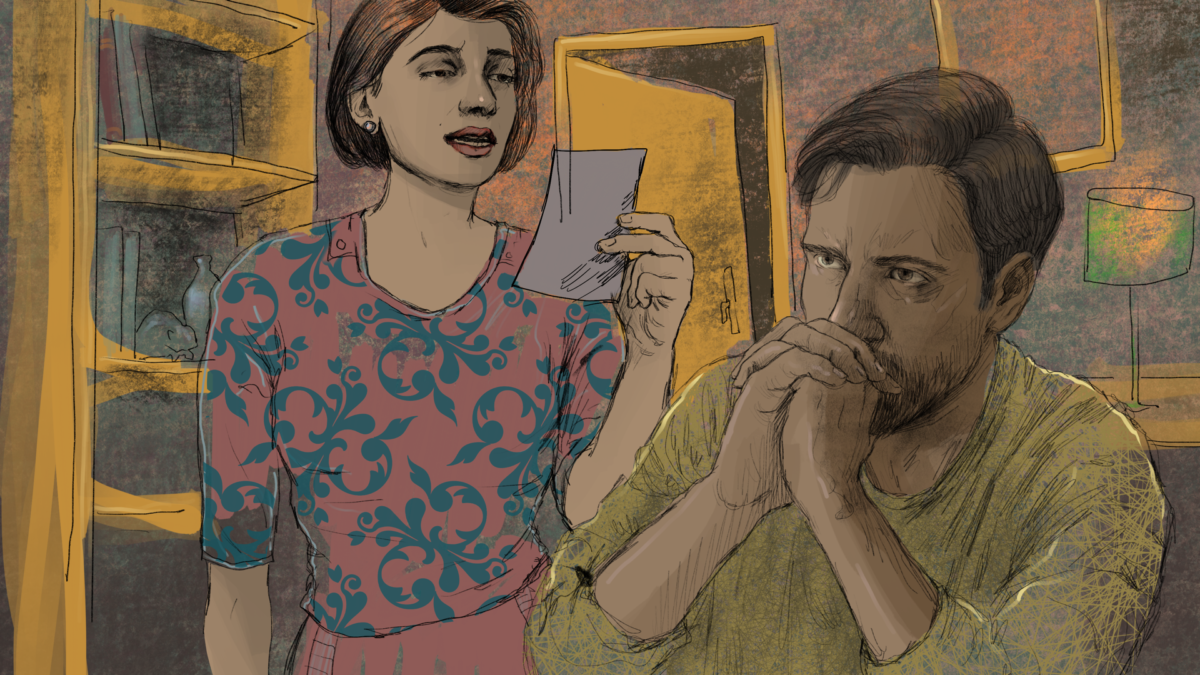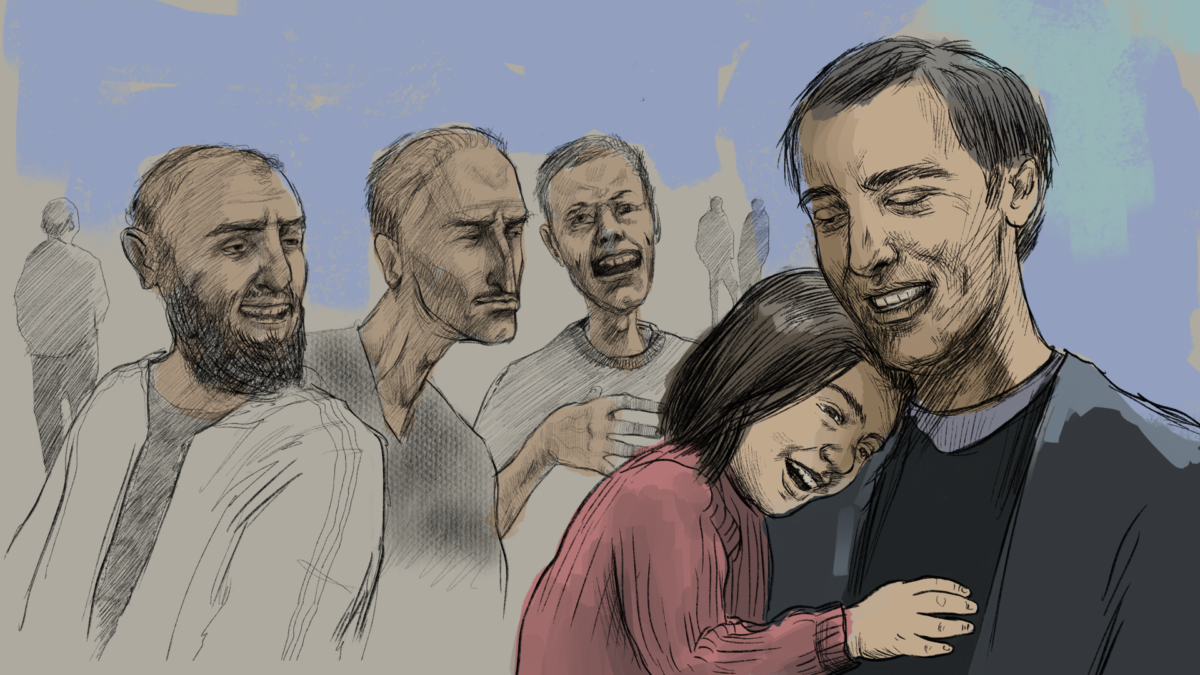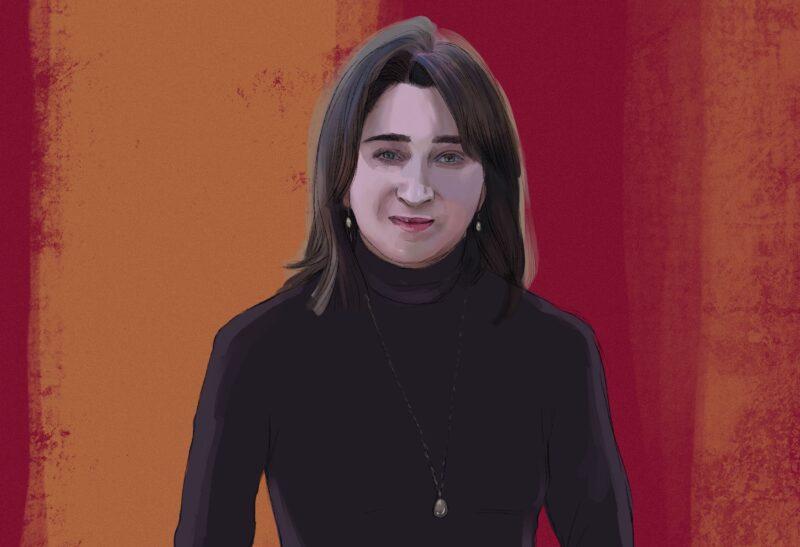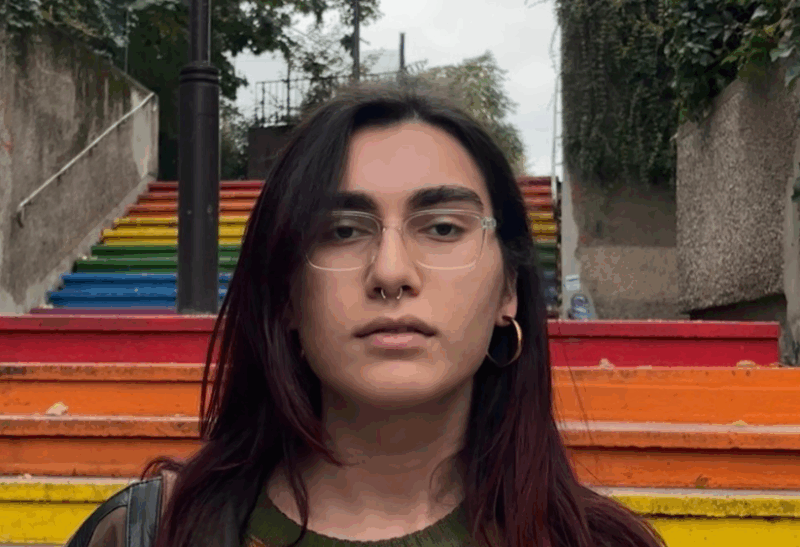“My husband beat me almost to death because I didn’t give birth to a boy. I got pregnant many times, but in the third or fourth month, when they found out that it was a girl, they forced me to have an abortion. I had to have an abortion two or three times a year until I finally gave birth to my son,” says Gulyum Takhmazova (name changed – A.F.).
A native of the village of Alchaly, Salyan district, Azerbaijan, Gülyum begged her parents for years to let her get a divorce, but her father did not agree. During her marriage, almost every pregnancy ended in forced abortion when it was found that she was expecting a girl. She divorced only after the death of her father. By this time, she had two daughters and one son.
Incomplete family
In 2022, Azerbaijan ranked first in the number of selective abortions, leaving behind China. Although the State Statistics Committee does not keep a separate account of them, the trend of a sharp predominance of boys over girls among newborns, which has been observed for many years, shows that selective abortions are widespread in the country. According to the statistics of 2021, there are 116 boys for every 100 girls in Azerbaijan .
According to statistics, in 2020 abortions were performed mainly by women who are in the most active reproductive age. If we consider the low probability of having a first child in the age groups of 25-29 and 30-34 years, the picture is as follows: 10,993 abortions were performed among 25-29-year-olds, and 9,445 among 30-34-year-olds. The number of abortions among the 20-24 year group is 7,552. In total, 34,719 abortions were recorded in Azerbaijan in 2020, and 37,308 in 2019.
Gynecologist Tarana Hasanova says that in Azerbaijan, the presence of a son in the family is considered mandatory. A family without male children is considered inferior. Therefore, families strive to achieve the birth of a boy by any means. By “any means”, the doctor refers to selective abortions. She admits that sometimes the reason for such abortions is that women themselves (including mothers-in-law and those who already have daughters) dream of a son.
“A few months ago, a patient came to my appointment, she wanted to have an abortion. She said – I already have a daughter, why do I need a second one? Along with her were her grandmother, mother, mother-in-law, about 7-8 women. They insisted very much,” says the gynecologist.
According to Tarana Hasanova, they did not follow the woman’s wish because “the child was healthy”, which greatly angered the women. When asked why they don’t want a girl, they said that the second child is guaranteed to be a boy.
“And the whole family said this, the whole family came, they just didn’t want, they didn’t want a girl at all, none of them, and they were very angry,” says Tarana Hasanova .
Under pressure
“There are families with two sons and no daughters, or three sons. And during the conversation, it turns out that the husband did not want the girl and therefore the woman had to go for a selective abortion”, – says the head of the Public Association “Women’s initiative and help in solving social problems” Zenfira Mustafaeva .
It is men who often make women go to selective abortions, Tarana Hasanova also believes:
” The woman told me alone: “I already had a son, my husband said that there should be only sons, there will be no girls in our house. The second one was a girl, and I really wanted a girl. In the fourth month, I lied that I am in the third month and the gender is unknown. And finally, once she said that it is impossible to see the gender of this child. Next, the woman says that her husband forcibly brought her to the ultrasound and found out that we have a girl”.

After that, he forced his wife to get rid of the child, and as a result, in the fifth month of pregnancy, she had an artificial birth:
“On the fifth month, the baby is already formed, large. To do such a thing on the fifth month is a crime. That woman also told me that, having heard about her unwillingness to have an abortion, her husband threatened to “give her such a kick in the life that she herself will go to that world together with her child.” After that she had to agree. She says that she was afraid that he would kill her, and the already existing son would be left an orphan.
“We had one family, the woman worked as a seamstress, now she left for Turkey, married a Turk. She has three daughters , – Zenfira Mustafaeva shares a story from her practice. – And imagine, the first daughter was born, her husband beat her, the second one was born – he beat her. She told me that during this time she went to selective abortions several times. For the third time, she said, they deceived me, they told me on the ultrasound that it was a boy, but a girl was born. That’s why her husband left her and left.
State against discrimination
The State Committee on the Problems of Family, Women and Children reported in response to a journalistic request sent to them that at the moment selective abortions have an effect on the quantitative ratio between male and female newborns. The committee sees the reasons for this tendency in the preference given to boys, existing gender stereotypes in the country, gender inequality, the patriarchal structure of the family, which inculcates the idea that male children are more “valuable”.
Back in 1994, the State Committee on Family, Women and Children, supported by the UN Population Fund, joined the initiative “to eliminate all forms of discrimination against girls and the root causes of the preference for the birth of sons, which leads to harmful and unethical practices such as female infanticide and prenatal selection floor”.
It was in this year that sharp gender imbalance among newborns began to be observed. Thus, according to Goskomstat data, in 1994 there were 109 boys per 100 newborn girls, and in the following years this difference began to increase. In 2000, there were already 115 boys per 100 girls, in 2010 – 117, in 2020. – 114, and in 2021 – 116. Along with it, the committee also reports a sharp decrease in natural population growth.
102-106 /100, that is, approximately 102-106 boys are born for every 100 girls in average in the world. In Azerbaijan, this indicator is 116/100 (Goskomstat, 2021). Statistics on selective abortions are not kept in our country, so the sex ratio at birth is, among other things, confirmation of the fact of selective abortions.
Available research data indicate that the percentage of women who have resorted to artificial abortion increases as the number of live births increases. The prevalence of artificial abortions among women with two or three male children is significantly higher than among women with two or three female children. For example, women with three male children had an average of 2.3 artificial abortions, while among women with three female children, this indicator decreased to 1.5 abortions. These results indicate that artificial abortion is a deliberate attempt to ensure the birth of male children in many Azerbaijani families.
Factors influencing perinatal gender selection are the patriarchal structure of society, the expressed preference for male children as the continuation of the family and the main heirs, the protector of the family and the country, the bearer of traditions and customs, as well as, since the 1990s, the availability of instruments for determining the gender of the child (UZI) and the overall decrease in fertility.
“Azerbaijan is a patriarchal society. And therefore, as in all patriarchal societies, the advantage is given to boys. Since girls do not play any role, in such societies girls play only a reproductive role. And society believes that boys have more opportunities and rights , says sociologist Sanubar Heydarova . – In addition, young guys and men jokingly tell each other that a man should have a son. Those who only have daughters are humiliated, joke with them very rudely. And although we can take it as a joke, it’s actually a problem. Men who are exposed to such “socks” feel very bad.

Is there an exit?
For the fight against selective abortions, the government of Azerbaijan has prepared the “Measurement plan for the prevention of prenatal sex selection of the child for 2020-2025”. This work was entrusted to the Ministry of Labor and Social Protection, where we were informed that certain studies were carried out within the stipulated period:
“Statistical data on the gender ratio of newborns in the country and regions are regularly collected and analyzed. Also, preparations are being made to conduct a corresponding survey among the population, the methodology is being developed .
The Ministry of Labor and Social Security says that the Ministry of Health is the main executive structure that should prepare proposals for improving legislation in the field of gender equality and reproductive health, and that negotiations are held in this direction at working and official meetings with representatives of the Ministry of Health.
Goskomstat also published information on the gender ratio among newborns by region for 2021, and it turned out that there is not a single region in the country where girls predominate among newborns. Even in the capital, girls are born less than boys: 11,824 out of 13,251.
In 2020, the Cabinet of Azerbaijan also made a decision to completely prohibit specifying the gender of the future child .
“In reality, we see that all this does not work. And parents can get this information from doctors whenever they want – says sociologist Sanubar Heydarova. – No doctor who performs these abortions and no doctor who names the gender of the future child has been punished yet. No fines, no fines, we have never seen doctors punished for this. And, of course, if there is no punishment, then prohibitions will not work”.
“If the state does not intervene, it will be catastrophic,” says gynecologist T. Hasanova, confident that the state should review the process of social security for families:
“The social security of families should be such that the family does not want to get rid of either the second or the third female child. Like in Soviet times. Otherwise, it can turn into a disaster. For example, 10 years ago in secondary schools there were 12-13 boys and 7-8 girls per 20 students. And now this gap has increased even more.
According to Z. Mustafaeva, multifunction programs are needed:
“Within the framework of these programs, it is necessary to carry out educational work, solve issues of female education, prevent early marriages and domestic violence. And you can’t blame everything on the state, public and non-governmental organizations must also educate people together. In every family, children must be brought up so that there are no differences between girls and boys. If there are differences, then surely the guy will not want a daughter after marriage. He will think that if my sister was humiliated in my family, they did not put her in anything, then my daughter will get married and be subjected to violence .
Sanubar Heydarova also notes the importance of educational work.
“We don’t see social videos about the fact that girls and boys have the same rights, that they can achieve the same success, ” she says . – And there is no such thing at the state level. Or let’s say, in Turkey, with which we have very similar customs, a one-time payment at the birth of a girl is more than for a boy. And girls get more financial help for training. This is all done, including, to encourage the birth of girls.
The committee on the problems of family, women and children believes that it is possible to eliminate the negative attitude towards girls by strengthening educational activities among the population and telling the media about the consequences of selective abortions.
The UN Population Fund also believes that various punishments and prohibitions will not help here:
“No organization is able to solve this problem alone, considering the scale of the problem, as well as the ineffectiveness of any administrative measures, prohibitions and punishments as such. The only effective way out of the current situation is to eliminate the deep-rooted preference for having sons in the country, including by challenging discriminatory and patriarchal social norms and gender stereotypes, as well as by ensuring equal rights and opportunities for women and men”.
However, the organization also reports on the problems fraught with selective abortions. Thus, according to the forecasts of the Population Fund, if serious violations of the sex ratio of newborns in Azerbaijan continue, then by 2050 the number of boys born annually will exceed the number of girls by 12-15 thousand.
The so-called gender-biased sex choice is a vivid manifestation of gender discrimination and gender inequality in the world and has devastating consequences for the future dynamics of the population. The experience of Southeast Asia, as well as the extensive evidence base of these countries, show that an excessive number of male representatives inevitably leads to a decrease in the number of marriages, which mainly affects people from lower socio-economic strata, an increase in aggressive behavior, an increase in the level of crime, early marriages and bride kidnapping, human trafficking, rape, and prostitution. All these consequences have a very negative impact on gender equality.
Sociologist Sanubar Heydarova also emphasizes the connection between selective abortions, gender imbalance and its potential harm to society:
“Selective abortions do not only affect the health of the mother and the child. After a few years, gender instability will arise in society. And this means that in the future there will be fewer women for every man. So much less that it can lead to increased aggression in society.”
According to her, the increase in the number of men leads to an increase in crime, as well as to increased militancy in society, as it increases the number of supporters of war:
“Do you know what it looks like? To the life of children who grew up in a barracks or in a closed men’s lyceum. Some teachers tell us that they notice a significant change in the gender composition already in primary classes. For example, there are 18-20 boys in a class of 25 students. So, the balance is significantly disturbed.”
Selective abortions are also discussed in women’s groups on social networks: some women tell that they were forced to do this, and people who know how to determine the sex of a child without an ultrasound give advice.
Meanwhile, Gülüm, who, after years of suffering, finally left her husband and settled in Baku, considers herself happy that she has daughters:
“I worked in the greenhouse, in the field, weeded and collected cotton to feed my children. She earned 13-15 manats per day. I realized that I could not cope with three children and came to Baku, to my sister’s house, rented a house next door. Now the children have grown up. My daughter graduated from medical college, works and helps me. How good it is that I have daughters… “
Note: While working on this article, the author also sent questions to MP Nigar Arpadarai, who represents the Committee on Family, Women and Children’s Problems in Parliament. However, Ardaparai did not answer the questions, and her assistant explained it by the fact that the deputy has too busy a schedule and no time.
With the support of “Mediaset”



